Wildlife trade
Wildlife crime and poor legislation has a massive impact on the survival of animal species across the globe.
Illegal wildlife trade is a massive threat to the survival of endangered wild creatures
Wildlife trafficking is currently the fourth-largest illicit trade activity in the world, after drugs, arms and human trafficking, with an estimated annual value of $7 billion to $23 billion. Yet legislation is often weak and the laws that are in place are frequently ignored. To make things even worse, in some places, police do not act because of corruption.
Wildlife trafficking is dooming wild animals to extinction
The illegal trade is having such devastating effects that it is creating massive imbalances in ecosystems and causing irreversible biodiversity loss. In short, it is destroying our planet.
The statistics are staggering. More than 38 million animals are taken from the wilds of Brazil alone every year to sell on the illegal wildlife market. Millions of sharks are illegally killed year after year for shark fin soup; every day, an average of two rhinos are killed for their horns, and poachers wipe out an estimated 20,000 African elephants each year for illegal ivory trade. Pangolins are the world’s most trafficked mammal – poachers slaughter an estimated 2.7 million pangolins in Africa every year, with Asia’s insatiable demand for their scales and meat fast-tracking the species to extinction.
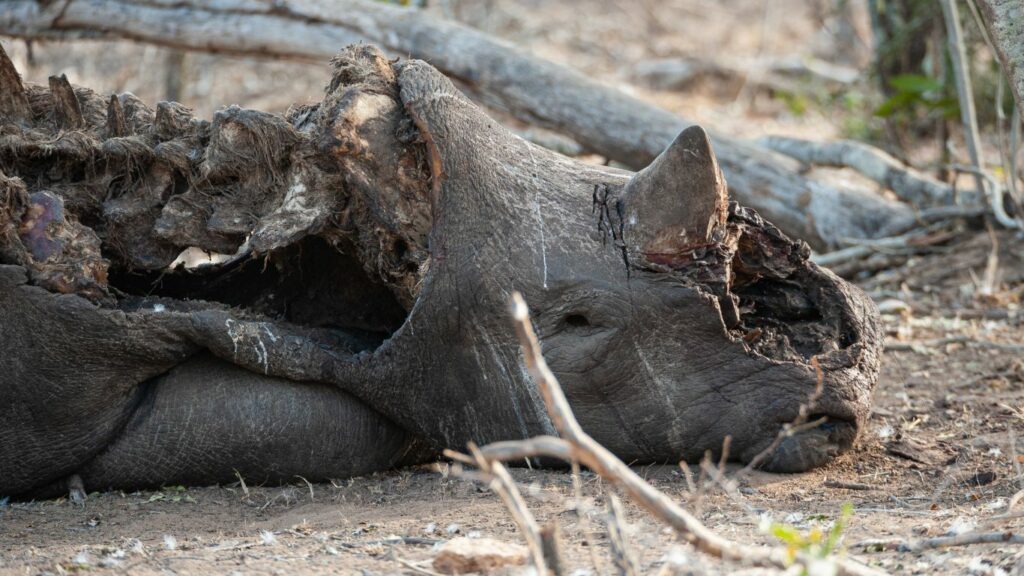
Lax wildlife legislation, poorly enforced regulations and commercial breeding of wild animals are destroying animal populations
Studies have shown that there is little to no conservation benefit to captive breeding programs of wild animals, and that legal trade only fuels the illegal wildlife trade. By creating legal wildlife markets, international efforts to reduce the demand for wildlife products is hindered, making these markets almost impossible to control or regulate. Big game and trophy hunting, and trading animal parts, is estimated to be worth $200 million annually, yet only 3% of hunting fees reach local communities.
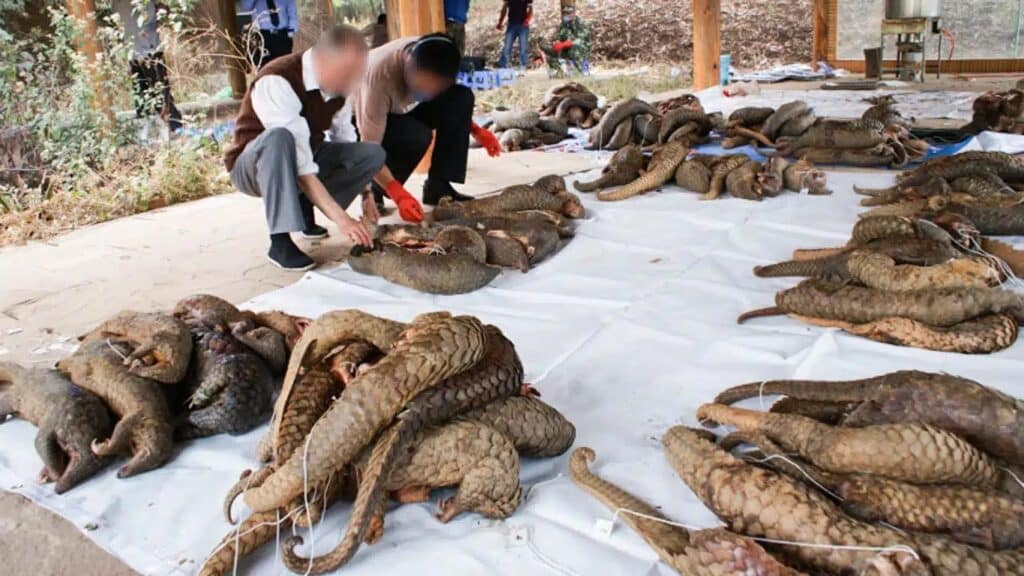
What we do to help animals affected by wildlife crime
Tackling wildlife crime is a priority for ASI and we work on the ground with several dedicated partners to assist in rescuing and rehabilitating trafficked animals.
Southern Africa 
Care for Wild Rhino Sanctuary, Mpumalanga
In South Africa alone, at least one rhino is killed by poachers every day to feed the insatiable rhino horn market in Asia. In 2023, 499 rhinos were killed in South Africa, a worrying increase of more than 10% compared to 2022. In the first six months of 2024, 229 rhinos were illegally killed in South Africa. We work with the Care for Wild Rhino Sanctuary (CFW) in Mpumalanga, which specializes in the rescue, rehabilitation, rewilding and protection of orphaned and injured rhinos. The exact location of the sanctuary is not disclosed for security reasons.
In June 2024, we funded two state-of-the-art AI-powered tracking collars for orphaned, critically endangered black rhinos Odin and Marcules, who are in an intensive protection zone. The collars provide an extra layer of protection for the animals in a country where rhinos are the hardest hit by poachers.
In December 2024, we funded specialized milk formula and supplementary feed for four orphaned rhino calves taken in by CFW.
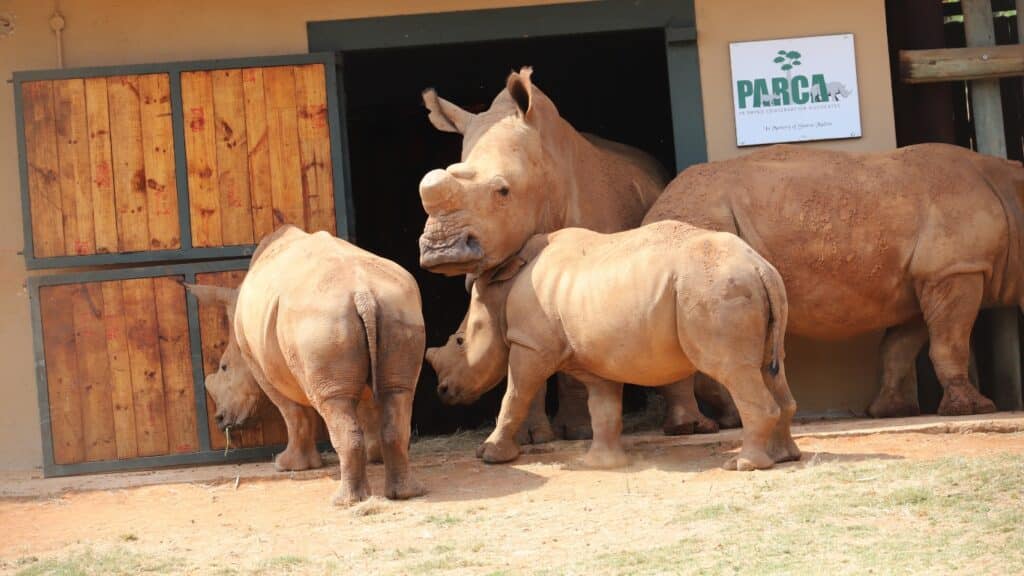
Hoedspruit Elephant Rehabilitation and Development (HERD), Limpopo
In Africa, more than 50 elephants are killed every day for their tusks – and for every mother killed, a defenseless calf is left behind. Much like human children, elephant calves are incredibly reliant on their mothers, staying with them until they are 16, and orphaned and abandoned calves often die within days of being left on their own.
Our partner in South Africa works to rescue injured and abandoned elephant calves, giving them the love and care they need to thrive. One such calf is Khanyisa, a rare albino who was caught in a snare that tore into her cheeks, mouth and ear, and who was found and rescued in September 2023. With our donors’ support, we helped provide specialized milk formula for three months, aiding her on her road to recovery.
Just a few months later, in March 2024, our partner found Phabeni wandering injured and alone, saving him in the nick of time. Fortunately, we were again able to raise the funds needed to help our partner provide the specialized care Phabeni needed. Tragically, Phabeni passed away later in 2024, but the other animals in HERD’s care continue to thrive.
Through our supporters’ kindness, we were also able to make a substantial contribution towards a borehole at HERD’s reserve, helping to ensure that water will always flow for their rescued elephants even during times of drought.

Hoedspruit Endangered Species Center (HESC), Limpopo
Mother rhinos with young calves are targeted by poachers for a simple, heartbreaking reason – they are much more likely to stand their ground to protect their calf, making them easy targets for well-armed poachers. And when these criminals kill mother rhinos, the helpless, vulnerable calves are left to fend for themselves.
Our partner in Limpopo provides safe shelter and dedicated care for young orphaned rhinos, who need specialized milk formula and round-the-clock care to ensure their healthy growth and survival. To support this crucial mission, while protecting the future of the species as a whole, ASI has contributed towards the shelter and care of several rhino calves.
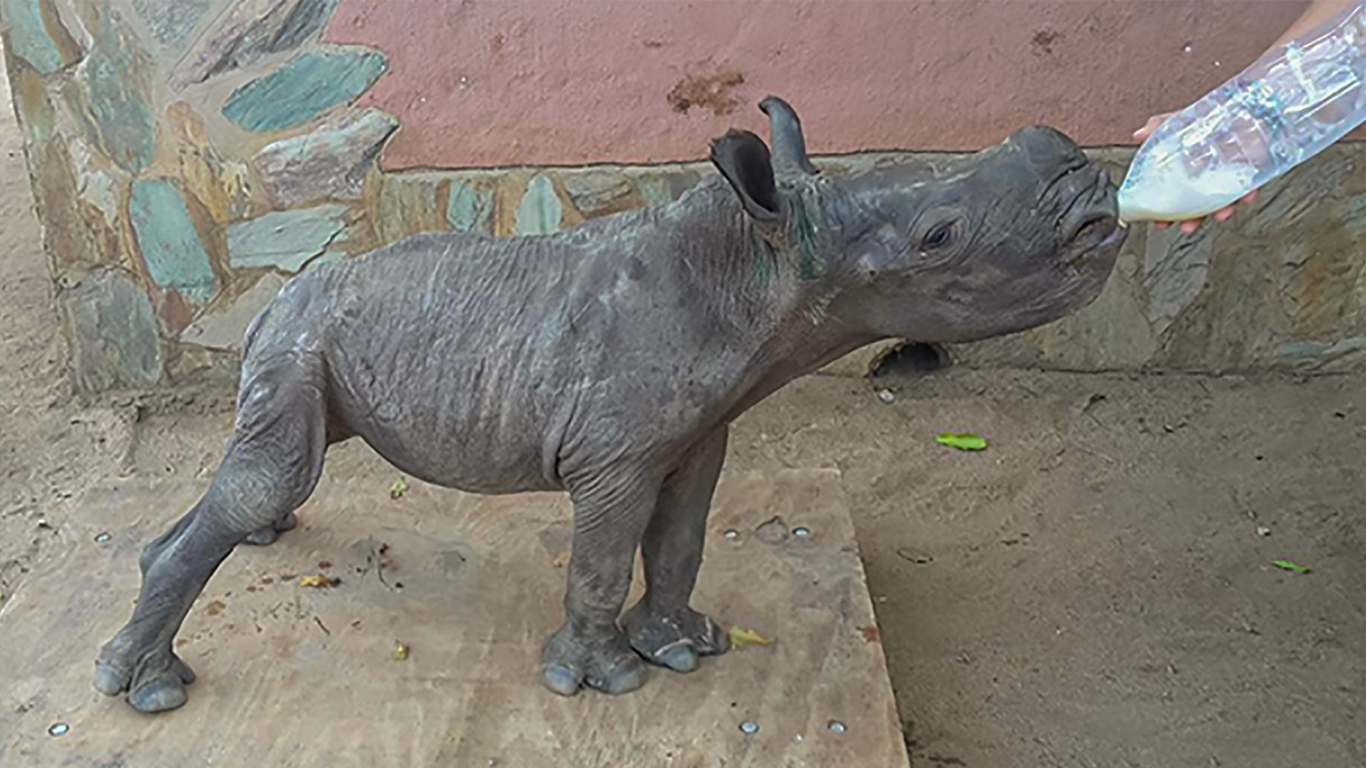
Umoya Khulula Wildlife Rehabilitation Centre, Limpopo
In the face of impending extinction, every single pangolin life counts. Millions of pangolins – many of which are members of critically endangered subspecies – are mercilessly slaughtered every year, hunted for their scales, skin and flesh. Pangolins are notoriously difficult to rehabilitate, requiring intensive and expensive round-the-clock care.
Through the generosity of our supporters, we have helped fund the rehabilitation of several orphaned, injured and displaced wildlife taken in by Umoya Khulula, including vulnerable Temminck’s ground pangolins.
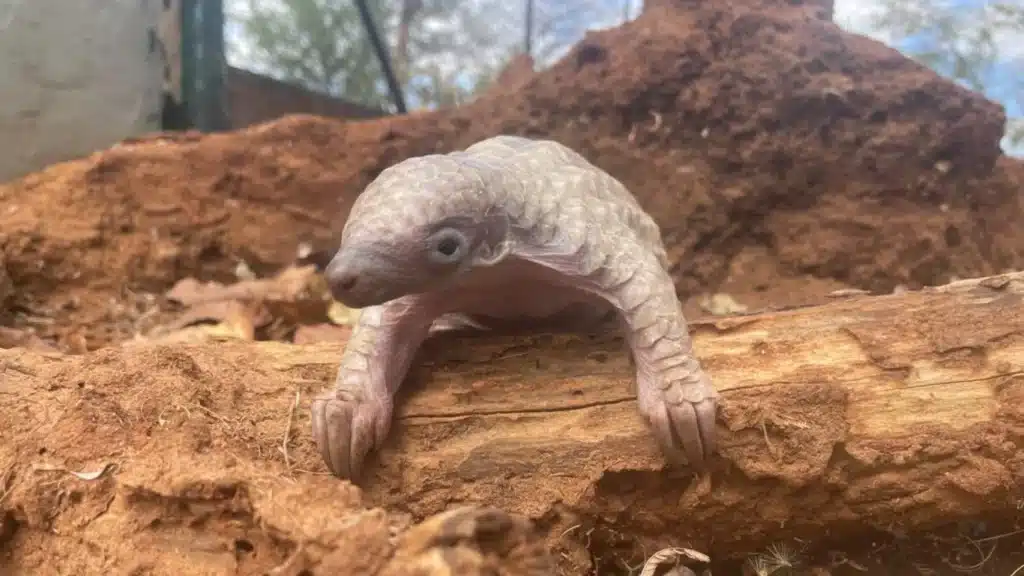
Addo Elephant National Park, South Africa
We work closely with the Addo Elephant National Park in South Africa’s Eastern Cape province. The park covers 630 square miles (1,640 square kilometers) of dense vegetation and is home to 600 endangered African savanna elephants. Africa’s elephant population is in the midst of a devastating poaching crisis, with more than 20,000 African elephants being killed each year for the illegal ivory trade. We actively support anti-poaching efforts in Addo by equipping teams on the ground with state-of-the-art equipment to better protect precious elephant populations.
Recently, Addo alerted us to an elephant family living dangerously close to a poaching hotspot. During a two-day operation using emergency funds, we and a team of wildlife vets located, darted and fitted the elephant family with new tracking devices powered by artificial intelligence. The devices monitor the animals’ movement and vital signs and even learn their behavior. In the event of abnormal activity, an alert is generated in real-time via network towers placed at various points across the park. This shortens response time to a matter of minutes and has completely changed the way Addo’s anti-poaching unit tracks, monitors and protects endangered wildlife species.
Addo’s anti-poaching unit has already received multiple real-time alerts thanks to the new devices we provided, allowing them to save elephant lives.
This has been a successful project, but our work is far from over. We intend to continue strengthening our anti-poaching efforts at Addo by fitting more elephants with life-saving, AI-enabled tracking devices.
We have also provided tracking collars for lions, funded canine anti-poaching patrols, and provided surveillance equipment for the anti-poaching teams.
From time to time, we assist with urgent animal issues in the park, including providing veterinary care and relocations.
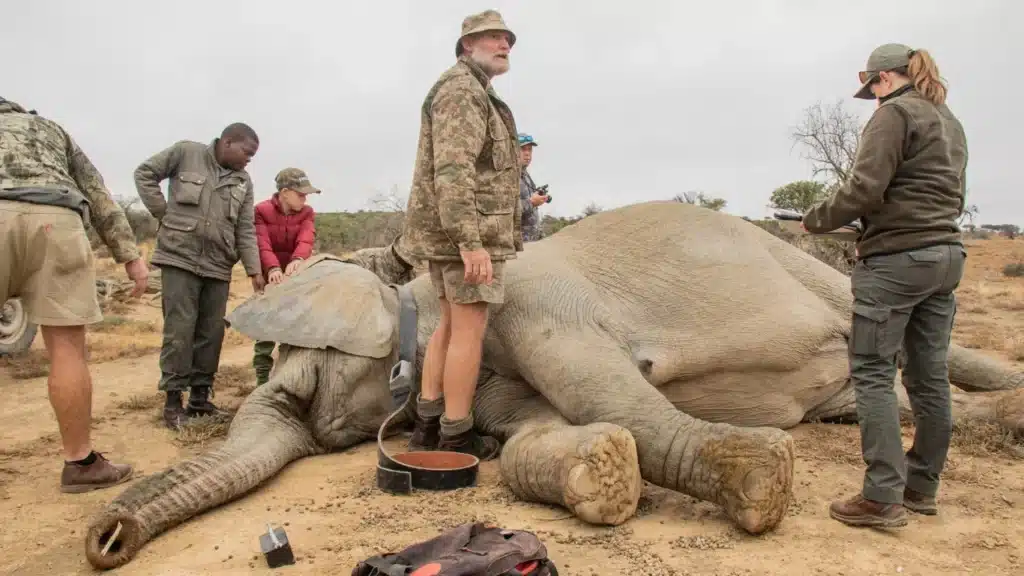
Panthera Africa Big Cat Sanctuary, South Africa
Panthera Africa cares for tigers, lions, leopards, caracals, servals and jackals that are emotionally, physically and/or genetically impaired and cannot be fully rehabilitated and released into the wild. Once at the sanctuary, they are given all the care they need for the rest of their lives, with no hands-on interaction, breeding or trades.
In 2023, ASI helped to relocate Gabriel, a 13-year-old leopard, to Panthera. Gabriel had been hand-reared and had only known a life of captivity. ASI funded his relocation to the sanctuary, where he is now thriving in his new life. We also funded the delivery of 75 tonnes of sponsored gravel to Panthera after storms and flooding caused severe damage to the sanctuary.
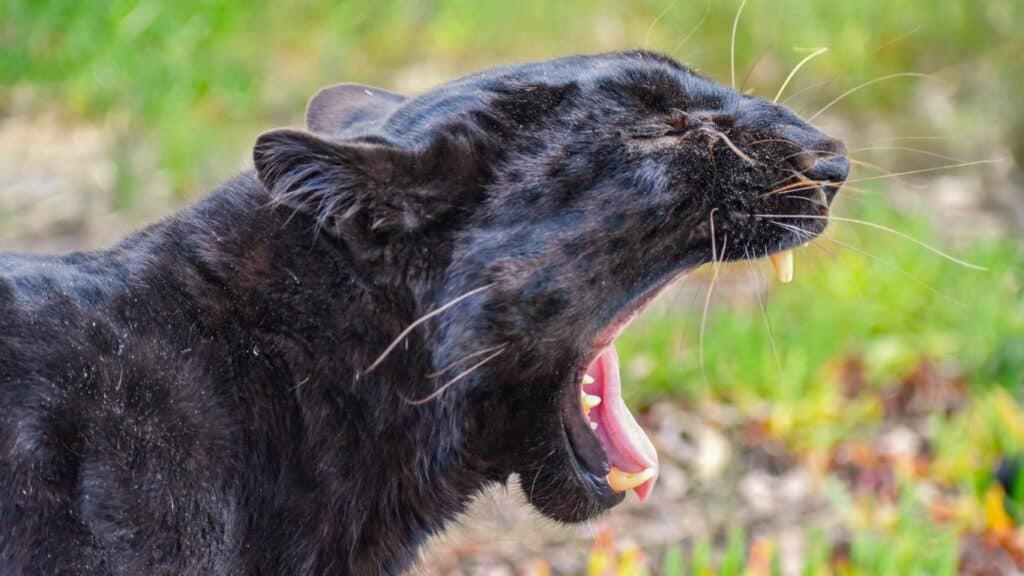
The Drakenstein Lion Park, South Africa
Lion cubs Issam and Kelly were just a few months old when they were rescued on the border of Lebanon, frail, sick and drenched in their own waste. Due to poor nutrition, lack of exercise and confinement in cramped cages for unknown lengths of time, both had severe developmental issues – especially Issam, who could barely support himself on his underdeveloped back legs.
Our partner in South Africa stepped in to give these cubs a permanent home and the care they will need for the rest of their lives. To ease the significant financial burden this placed on our partner, and to ensure that they could continue to rescue animals in distress, it contributes towards their long-term care and rehabilitation, helping to give the cubs the care they dearly needed.
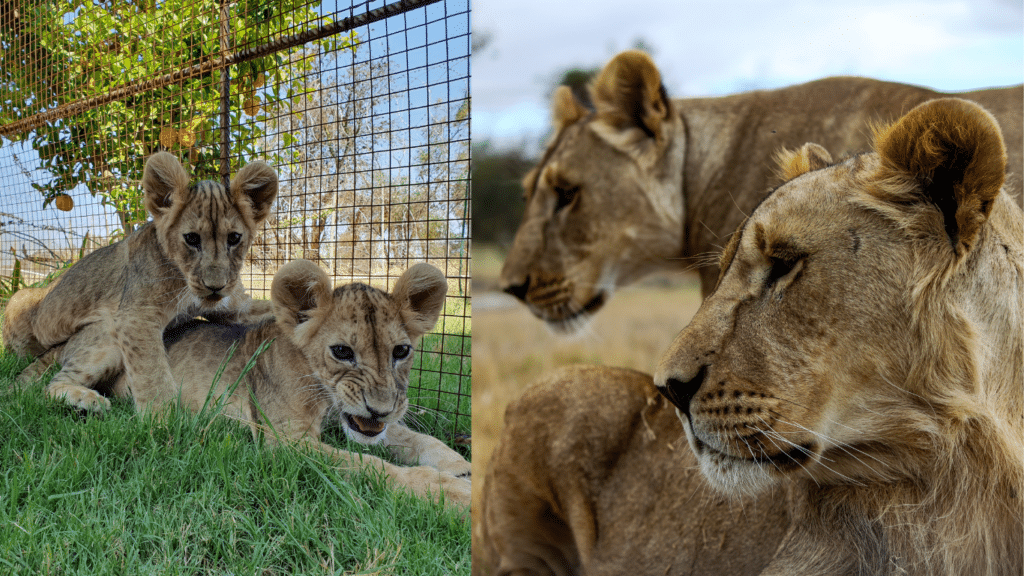
The Lions Foundation, South Africa
The Lions Foundation in Limpopo, South Africa, provides lifetime shelter and care to big cats rescued from circuses, private ownership, zoos and animal parks.
ASI contributed towards the relocation of two young lions from a Kuwaiti zoo to the Lions Foundation in 2022, after both were saved from the illegal pet trade in the Middle East. We also contributed to the costs of sterilization and food for some of the lions in their care. The big cats in Lions Foundations’ care have never learned to survive in the wild, and the sanctuary rehabilitates them to help them adjust to living in semi-wild enclosures that closely resemble their natural habitats.
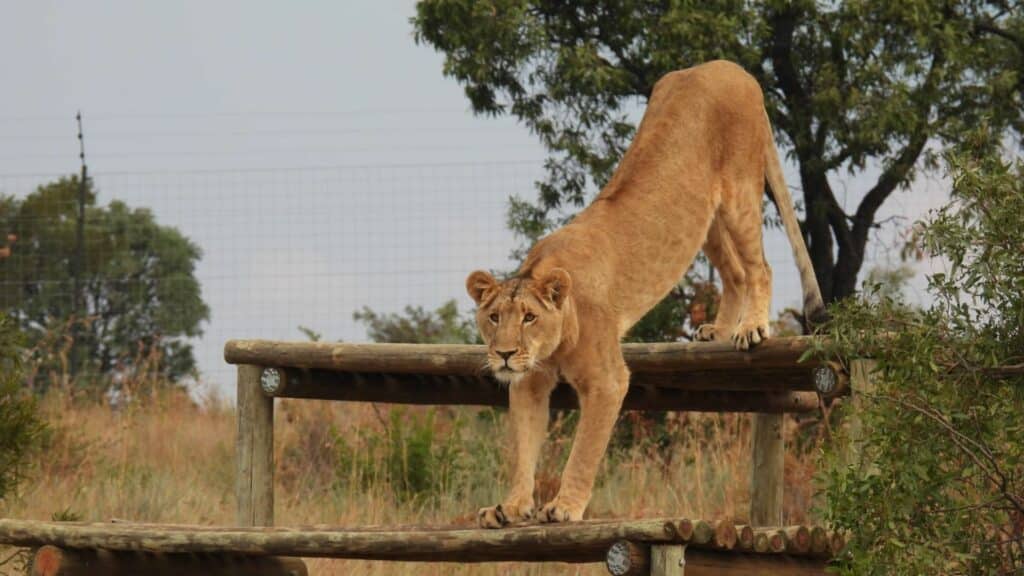
FreeMe Wildlife, South Africa
Our partner in KwaZulu-Natal, South Africa, FreeMe Wildlife (FMW), rescues, rehabilitates and releases wild animals affected by habitat loss, climate change and the illegal wildlife trade. The number of animals in need is constantly growing.
Through the generosity of our supporters, we have been able to help FMW build additional wildlife enclosures for the injured, orphaned and traumatized animals they care for, increasing their sanctuary capacity and giving countless rescues a second chance at life.
We were also able to help when their rescue vehicle was destroyed in an accident. We covered the shortfall in the funds they needed to purchase an appropriate replacement, after the insurance company did not cover the full costs.
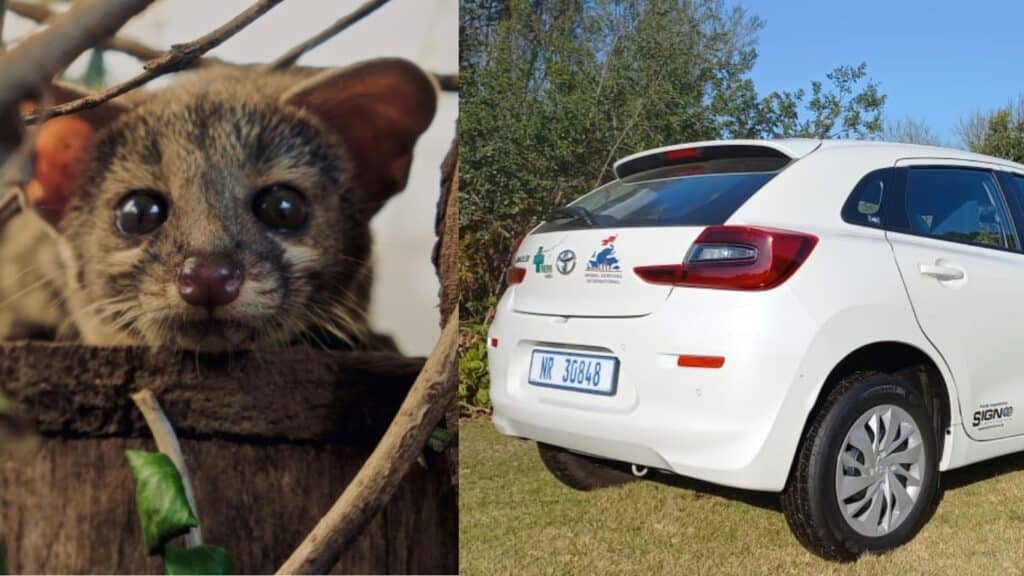
Zimbabwe 
Zambezi Conservation Unit (ZAMCON), Zimbabwe
The Zambezi Conservation Unit (ZAMCON) is an anti-poaching and patrol team that operates on multiple reserves and parks in the Zambezi area of Zimbabwe. In collaboration with Zimbabwe National Parks and researchers. It operates within a 200 square kilometer area along the Zambezi River, covering over 60km of riverfront.
The sighting of a snared hippo cow and her calf – both of which disappeared into the bush and were unable to be found by the team by road or boat – highlighted the need for more advanced technology that would allow the ZAMCON patrol team to more easily locate, sight and monitor injured or at-risk animals. Thanks to our supporters, we were able to help ZAMCON purchase a high-tech drone, and they are now much better equipped to both stop poachers and more efficiently locate and help injured animals.
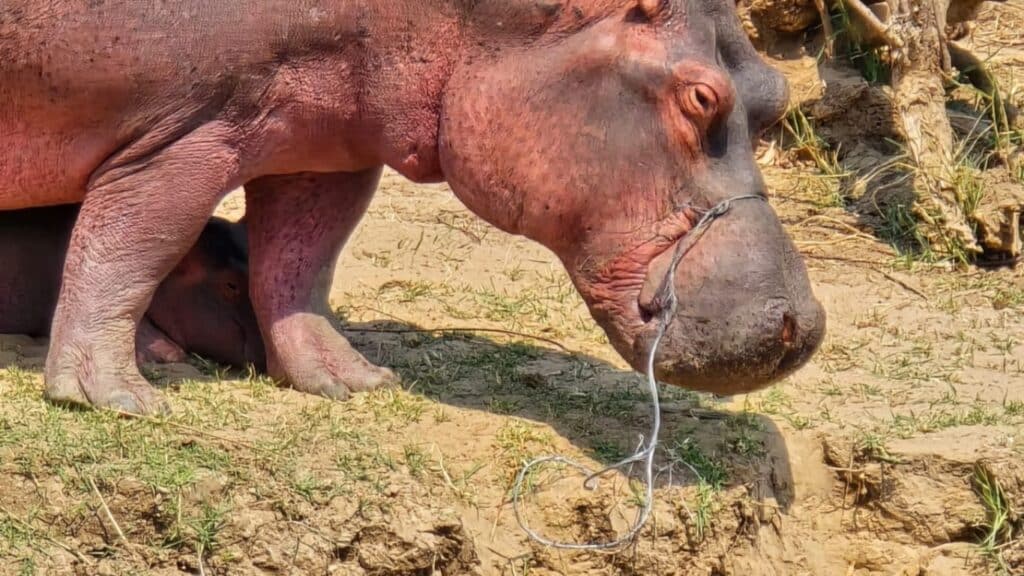
Zambezi Anti-Poaching, Zimbabwe
Southern Africa is facing a severe and ongoing drought. Although the region still receives some annual rainfall, it’s simply not enough to sustain the growing demand for water from wild animals. As a result, countless animals struggle to find safe water sources where they are not at risk of being poached by humans.
One of the few reliable water sources is the Zambezi River, which forms the natural border between Zimbabwe and Zambia. Unfortunately, poachers know that animals have few choice but to visit the river to drink, setting traps and lying in wait for thirsty animals as they approach the river.
To combat this crisis, we are working with a dedicated wildlife partner in Victoria Falls that assists the Zimbabwe Parks and Wildlife Management Authority with ranger deployments, anti-poaching efforts and sustainable water solutions. Together, we aim to support the installation of solar-powered boreholes in strategic locations to create safe watering holes. These boreholes not only provide much-needed water for wildlife, but also help keep animals away from dangerous poaching hotspots along the river.
Our goal is to install three solar-powered boreholes, each capable of providing water to at least 2,000 animals per day. With the border impossible to fully secure, these boreholes are a vital lifeline – giving wildlife safe access to water while reducing the risk of poaching.
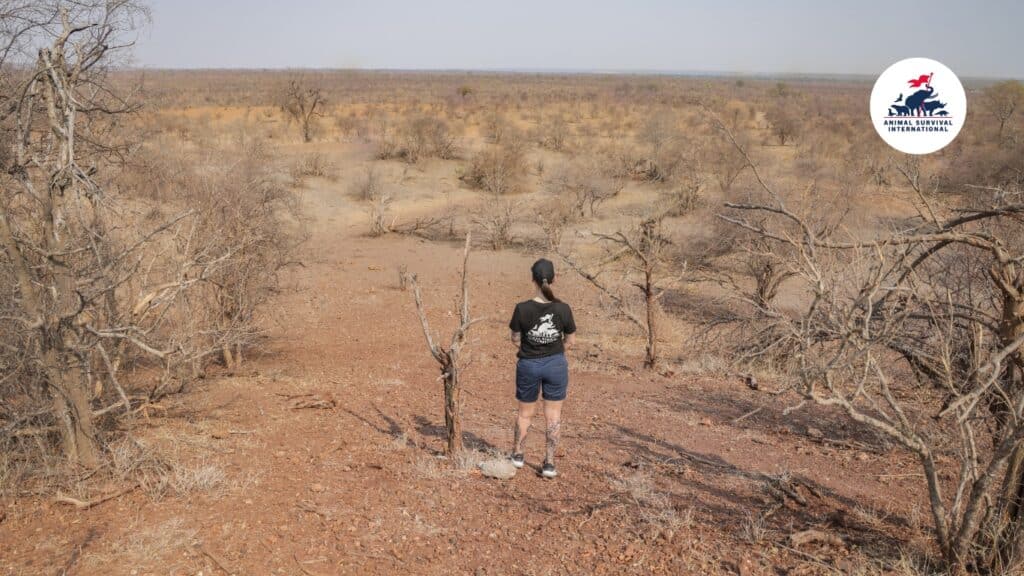
Friends of Hwange, Zimbabwe
In Zimbabwe’s Hwange National Park and surrounds, snares are becoming increasingly common. Usually, poachers are looking to capture animals they can slaughter and sell as bushmeat, or those they can sell for their skin, scales or tusks. Our partner works tirelessly to remove as many snares as possible, but animals are frequently caught, requiring immediate rescue and medical attention.
African painted dogs are one of the many victims of snares. Currently, there are only 7,000 painted dogs left worldwide, with 10% of them living in the Hwange area – so each and every life counts. Working with our partner, Friends of Hwange, we were able to help provide emergency medical care to painted dogs caught in snares, while supporting the team’s constant efforts to remove snares from the wild before they snag an unsuspecting animal.
Leopards are another common target for poachers, hunted for their skins to supply a brutal sector of the fashion industry. In just 50 years, an estimated one million leopards have been killed in Africa, and few are left in the wild.
Unfortunately, due to their secretive nature, leopards are hard to track. With Hwange standing as one of the few remaining strongholds for leopards, we helped our partners enact a collar and tracking program, assisting them in not only learning more about the reality facing leopards today, but to monitor and rescue those that get caught snares and other traps.
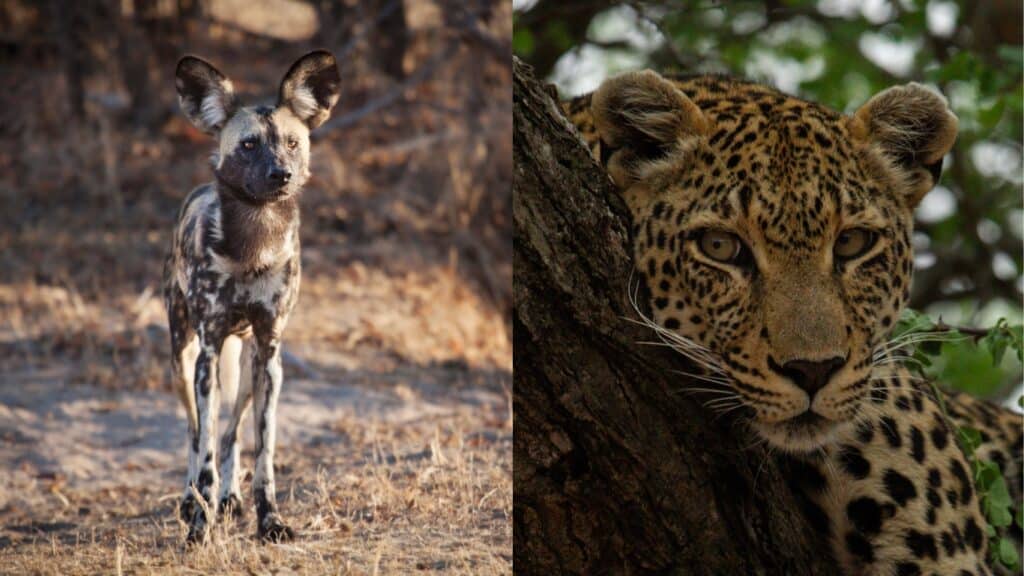
Bumi Hills Anti-Poaching Unit (BHAPU), Zimbabwe
In Zimbabwe, we have a long-standing partnership with the Bumi Hills Anti-Poaching Unit (BHAPU), a small, private anti-poaching unit that protects the elephant and wildlife population in the Lake Kariba region. ASI has assisted with the purchase of a Land Cruiser and the refurbishment of its patrol boat, allowing BHAPU to monitor both land and water for poachers, as this area is a known poaching hotspot. We also help fund critical anti-poaching and surveillance equipment, snare sweeps and training to protect the dwindling elephant population, along with countless other species.
We support all aspects of BHAPU’s 24/7 anti-poaching patrols, helping to deter, track and capture poachers, while protecting the precious wildlife of Kariba. We remain dedicated to helping our partner secure the area for wildlife.
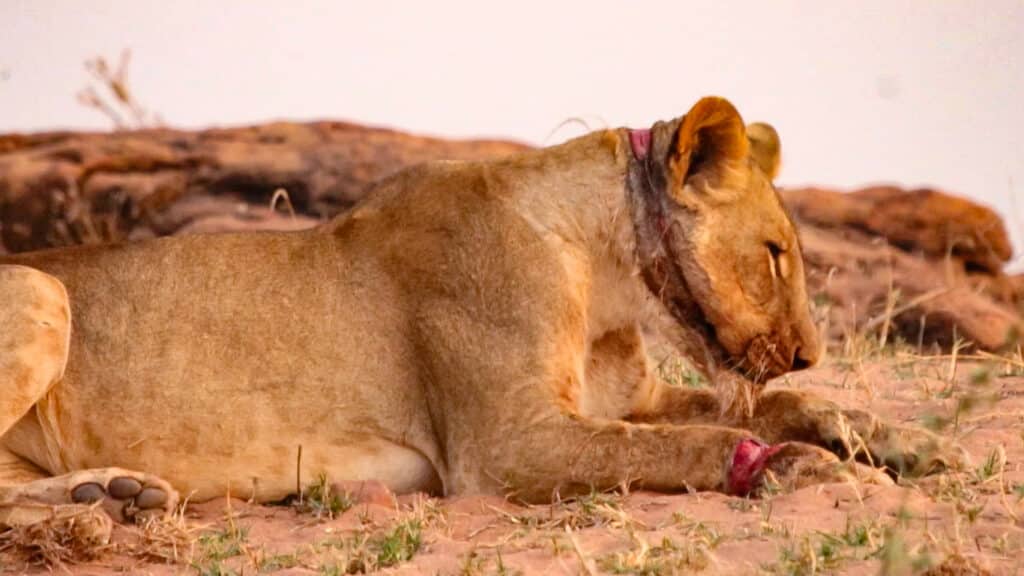
Kariba Animal Welfare Fund Trust (KAWFT)
In Zimbabwe’s Lake Kariba region, as in areas and countries across the world, poachers use cruel, deadly snares to snag their prey. These crude traps act as nooses, tightening more and more each day – and big animals such as elephants often end up dragging them around for days, slowly succumbing to the deepening injuries unless humans intervene.
Our partner in the Lake Kariba area, Kariba Animal Welfare Fund Trust (KAWFT), monitors various herds of elephants, and when they spot one suffering from a snare injury, they leap into action. However, the only safe and effective way to rush aid to an elephant in the wild is by darting them from the air, requiring an expensive helicopter charter – something our partner doesn’t always have the funds for.
Through our supporters’ generosity, we have helped fund the de-snaring of four elephants over the course of 13 months: A female and a calf in July 2023, a young male elephant named Masimba in February 2024, and an elephant calf called Nyaodza in July 2024.
In March 2025, KAWFT reached out with an urgent situation – a young elephant calf was spotted limping behind its herd, a snare wrapped tightly around its leg and cutting deeper every day. Through our supporters’ compassion, we helped raise the funds to dart the calf from the sky, and after the team removed the snare and provided emergency care, the calf recovered beautifully.
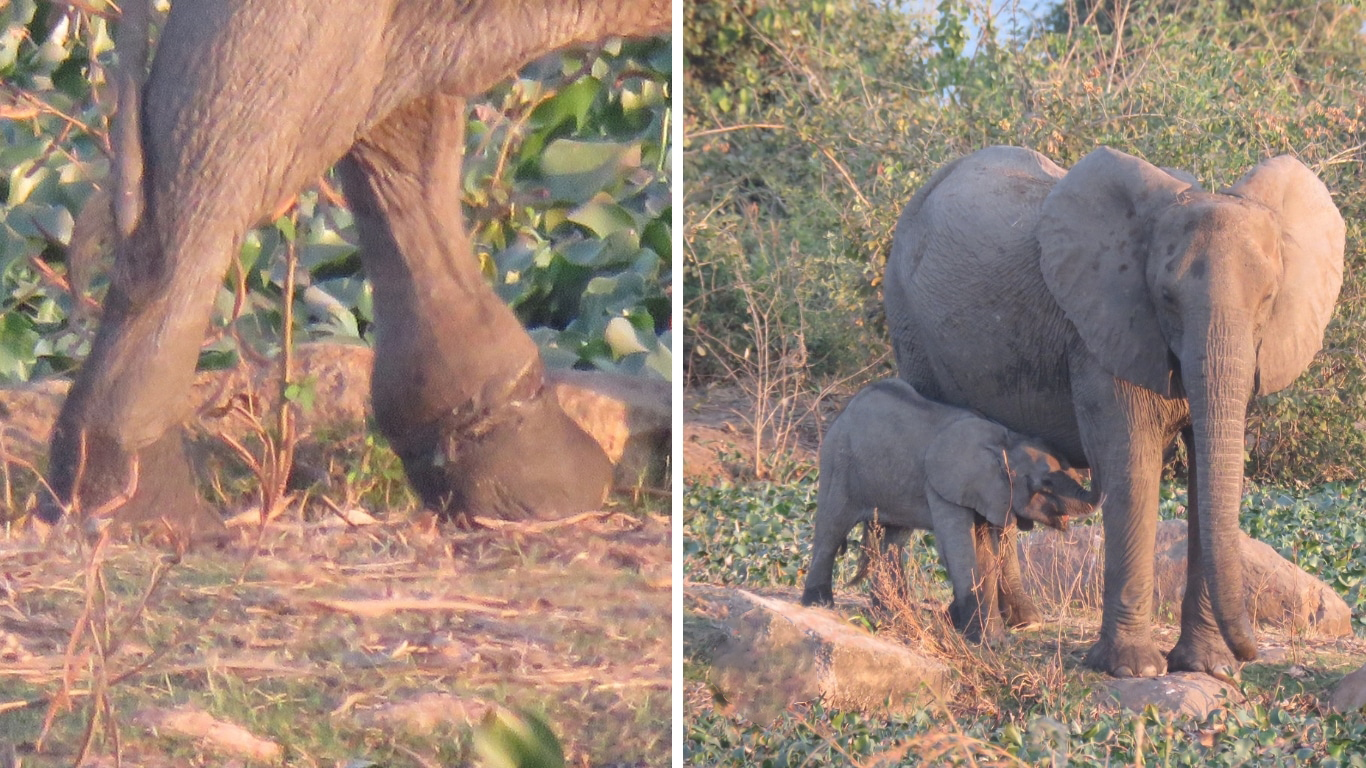
Matetsi Anti-Poaching Unit (MAPU), Zimbabwe
Our partner, the Matetsi Anti-Poaching Unit (MAPU), has successfully stamped out poaching in the vast reserve they patrol in the Victoria Falls region.
However, the team noticed increased poaching in the conservancies surrounding the reserve. We supported their unit in two key ways: By replacing their crucial anti-poaching boat after it was destroyed by a crocodile, and by purchasing a drone equipped with infrared technology to effectively monitor the massive areas that border the reserve. Both of these tools have enhanced their anti-poaching efforts, helping ensure that even more animals can be protected.
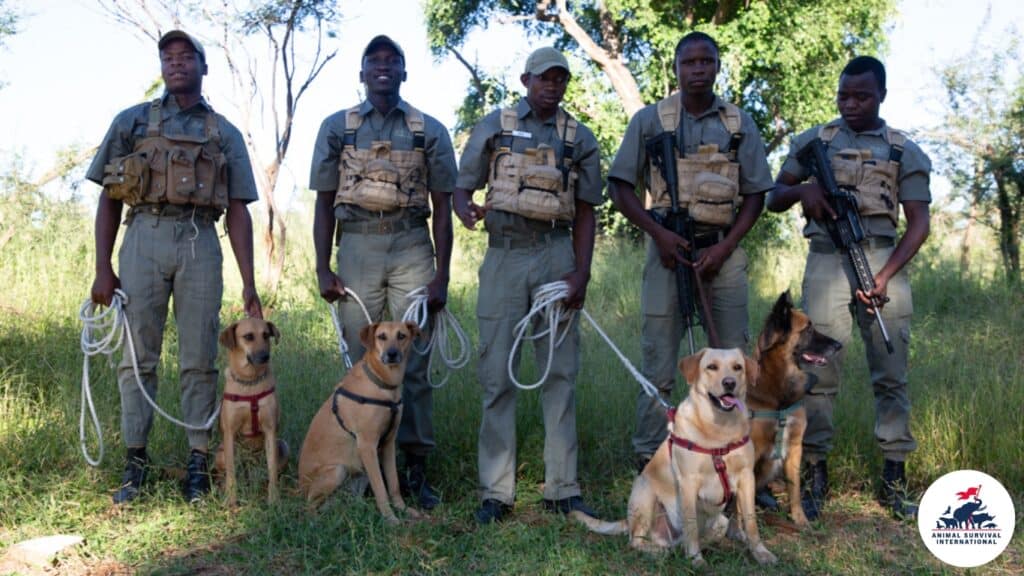
East Africa 
Protect Paradise Seychelles
In the Seychelles, fragile, defenseless flying foxes are slaughtered in their thousands for ‘bat curry,’ a dish that is touted as a local ‘delicacy.’ Using crude fishing lines and hooks, harvesters rip these gentle creatures from the sky, and those that aren’t killed by traps are beaten and stabbed before being skinned and eaten. Beyond this constant violence, their habitats are constantly shrinking, and they frequently collide with powerlines, killing them or leaving them fatally injured.
Our partner, Protect Paradise Seychelles, works to rescue injured and orphaned flying foxes and we have been a loyal supporter of their work. We raise funds for crucial veterinary equipment and help them cover the costs of rehabilitating and caring for rescued flying foxes, most of which are orphans.
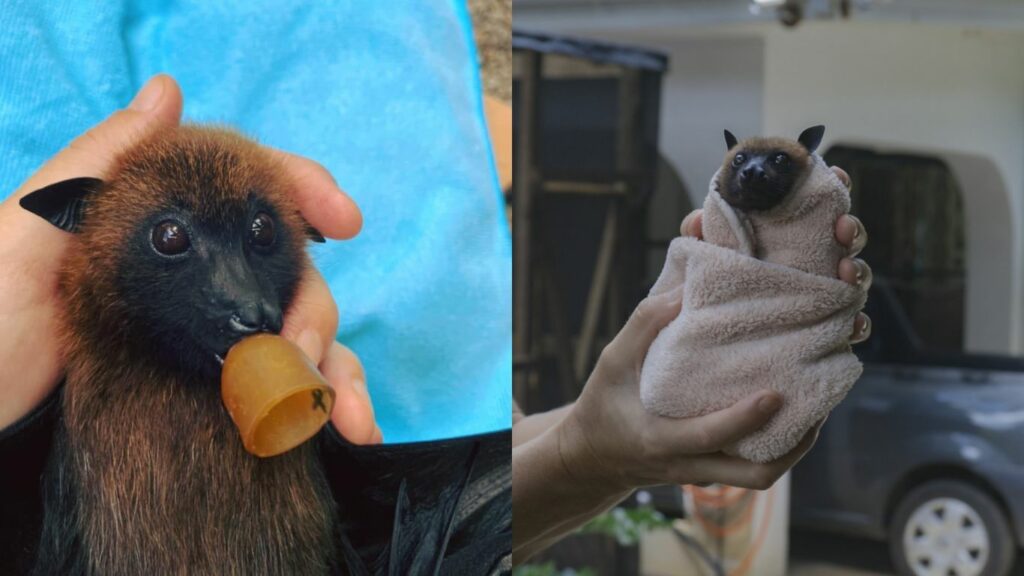
West Africa 
Greenfingers Wildlife Conservation Initiative (GWCI), Nigeria
In Nigeria, a brutal ‘bushmeat’ trade sees hundreds of thousands of animals ripped from their natural environments, tortured in illegal markets, and eventually killed for their flesh and body parts. Amongst these are critically endangered animals like pangolins, and endangered animals such as lions, elephants and gorillas.
We work with Greenfingers Wildlife Conservation Initiative (GWCI) to help rescue these animals from meat markets and rehabilitate those they are able to save. Through our donors’ generosity, we have been able to fund critical milk formula and costly treatment for orphaned pangolins, Most recently, we are helping GWCI build and equip Nigeria’s first dedicated pangolin ICU. We will continue to keep you updated on its progress.
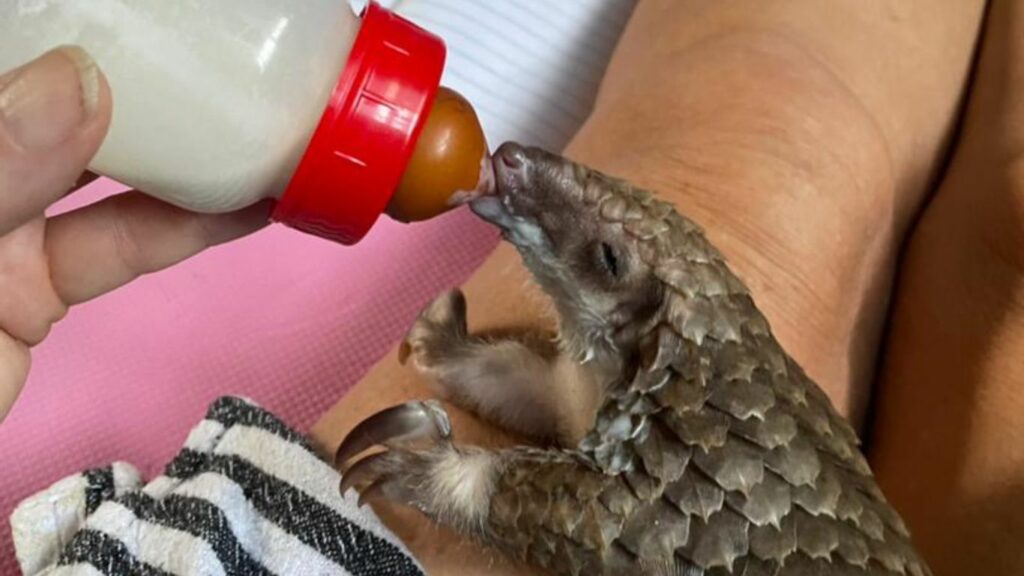
Europe 
Montenegro
In the Balkan country of Montenegro, we have fought a long battle for better conditions for Ljubo, a brown bear who has spent his whole life in captivity.
When we first heard of Ljubo’s plight in 2022, he was living in a cramped cage, and was so stressed, he would bite his arms and the bars of his prison. He was used to make money for his keeper, who would charge tourists to throw fruit at Ljubo and take selfies with him.
With our supporters’ help, and together with our partner Four Paws, we fought tirelessly for better conditions for the poor bear. We are pleased to report that Ljubo has been permanently moved to a larger, more appropriate enclosure, and we will continue to monitor his situation and overall well-being.
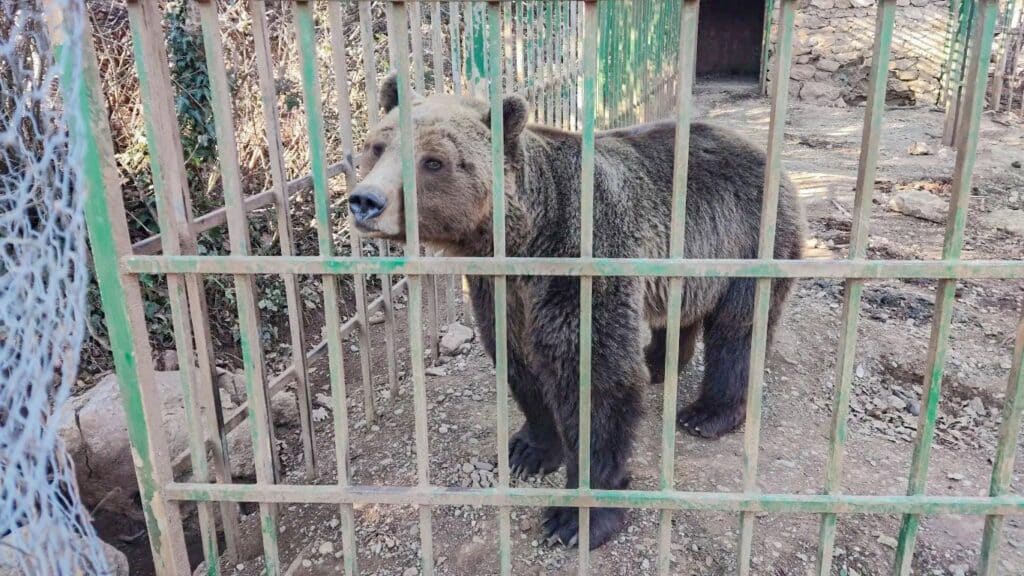
In August 2023, a bear cub mysteriously appeared at the same facility. Its ‘keeper’ states the cub appeared on his doorstep. Named Djuro, we fought for the cub as we had for Ljubo – but the young animal disappeared under mysterious circumstances in late 2024. All our efforts to locate him since have come to nothing.
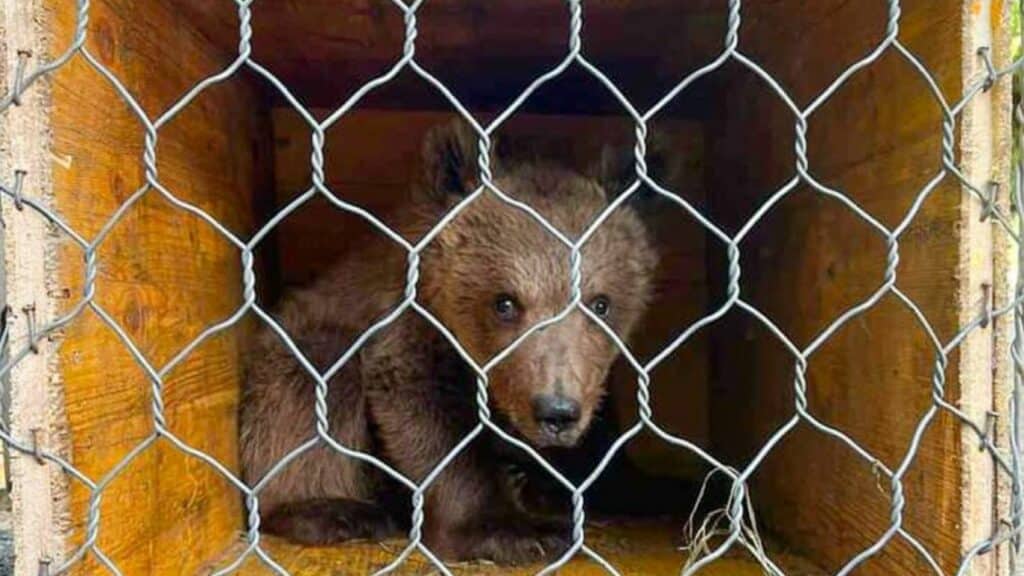
Wild Animals Rescue Center (WARC), Ukraine
The Wild Animals Rescue Center (WARC) in Ukraine rescues wild animals such as lions and tigers from dangerous areas, with the help of the military. The team, led by Natalia Popova, initially started as an equestrian center but transformed into a transition shelter for wild animals displaced by the war.
WARC rescues smaller mammals and larger creatures like lions, tigers and bears. Rescued animals are brought to the center, where they receive expert veterinary care and rehabilitation. Whenever possible, they are released back into the wild. For those who cannot be released, WARC provides lifelong care or relocates them to suitable sanctuaries, both within and outside Ukraine.
One of WARC’s biggest expenses is the funding of rescue missions over long distances in rugged terrain on war-damaged roads. ASI provides funding for specialized equipment to ensure these rescue missions can continue.
ASI also helps fund the care of WARC’s rescued lions. In early 2025, a crucial aspect of their care was heating for their enclosures – these animals are not used to the icy Ukrainian winters, with temperatures dropping as low as 4°F (-20°C). Thanks to our supporters, we were able to make a substantial contribution towards heating costs, keeping the animals warm and healthy throughout the cold months.
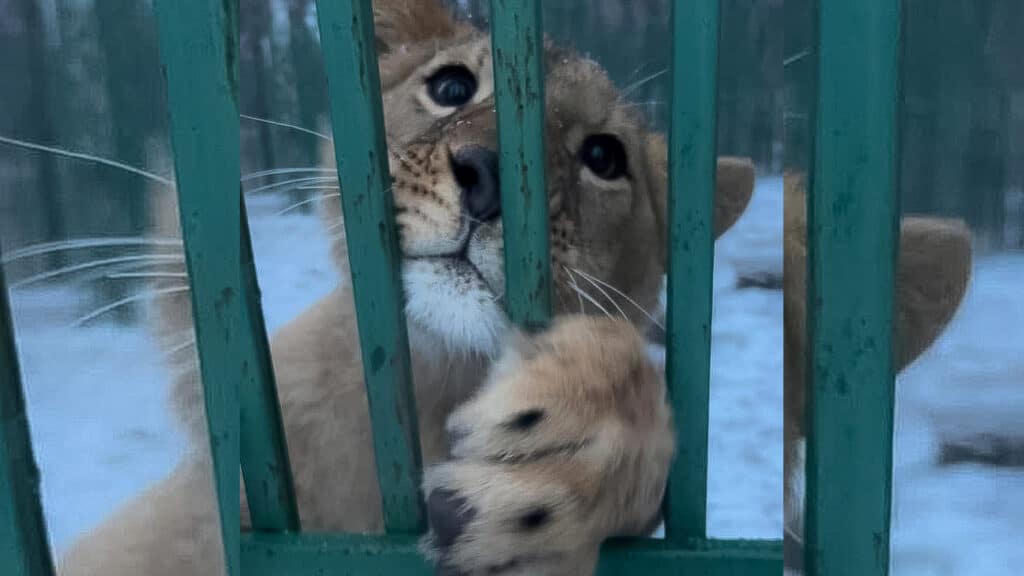
WildSide Exotic Rescue, Hertfordshire, United Kingdom
When police raided a cruel captive facility in Hertfordshire, UK, they found a shocking scene. Multiple big cats, including pumas, lynxes and bobcats, were being kept in terrible conditions, malnourished and neglected. Unless they found new homes fast, authorities were threatening to euthanize them.
Our partner, WildSide Exotic Rescue, took in 12 big cats. Tragically, one was too far gone to be saved, but the 11 survivors desperately needed medical care, special food and supplements – a cost our partner was struggling to meet. Through our supporters’ generosity, we were able to contribute a month’s worth of food and support for the animals.
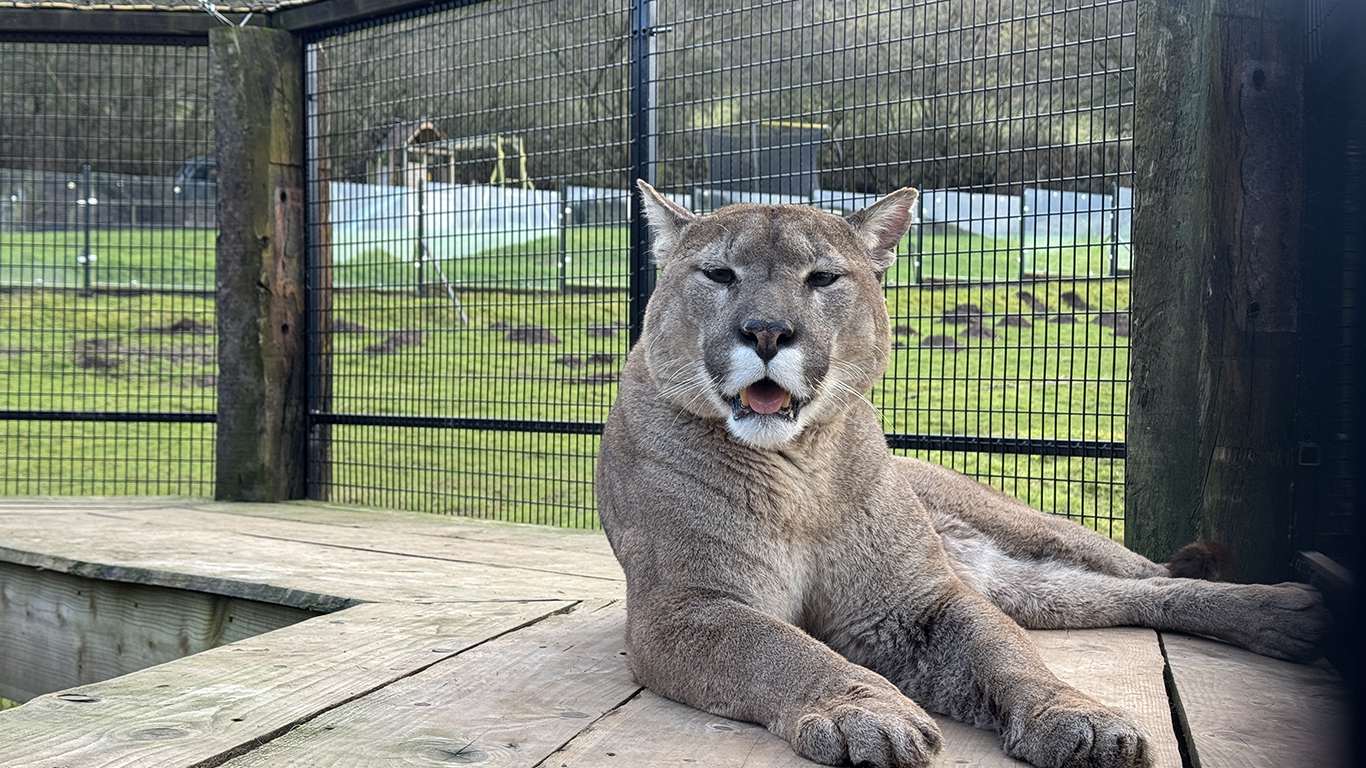
National Anti-Snaring Campaign (NASC), United Kingdom
In the United Kingdom, legal snaring kills up to two million animals every year. Together with our partner, the National Anti-Snaring Campaign (NASC), we work to enact a complete ban on snaring.
In 2021, ASI funded a report which exposed the inhumanity and inadequate animal welfare standards associated with snaring. The report highlighted the high incidence of unintended captures, including many animals which were crucial to conservation efforts.
Sadly, the animals are up against the might of the UK government’s Department for Environment, Food and Rural Affairs (DEFRA), which has publicly stated that snares are “an effective and relatively humane form of control.”
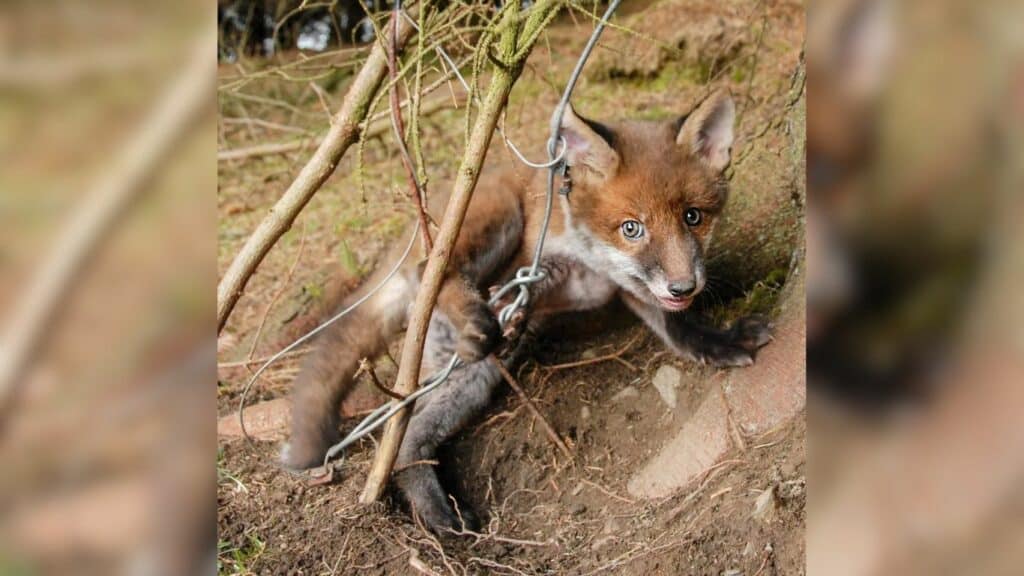
Asia 
Wildlife Friends Foundation Trust (WFFT), Thailand
We have supported the work of our partner, Wildlife Friends Foundation Trust (WFFT), since 2023, helping it with two major big-cat relocations in Thailand. These tigers and critically endangered Indochinese leopards were rescued from a facility in northern Thailand, which was subsequently shut down. We helped fund the relocations of 20 big cats to the beautiful, spacious WFFT sanctuary in Phetchaburi.
Big cats are not the only animals cruelly taken advantage of in Thailand. Elephants face severe abuse, being used to haul up to six people at a time on a heavy wooden seat strapped to their backs. Pai Lin is one such elephant, being forced into back-breaking labor for 60 years before her owners discarded her for being ‘too old.’ WFFT took the elderly elephant on, and together with our supporters, we provided almost 200 tons of delicious and nutritious food and treats, feeding Pai Lin and WFFT’s other rescued elephants for two months.
Soon after saving Pai Lin, WFFT rescued another elephant who had endured 30 years of cruelty and abuse. Boon Dee was similarly forced to carry busloads of tourists on her back; her owners disciplined her with bullhooks when she disobeyed, leaving her body covered in wounds and scars. This poor girl was so traumatized that she was terrified of other elephants, and we are working on building her a safe home with access to her very own lake so she can enjoy her retirement.
We have also helped to provide long-term care and support to other rescued tigers and elephants in WFFT’s care.
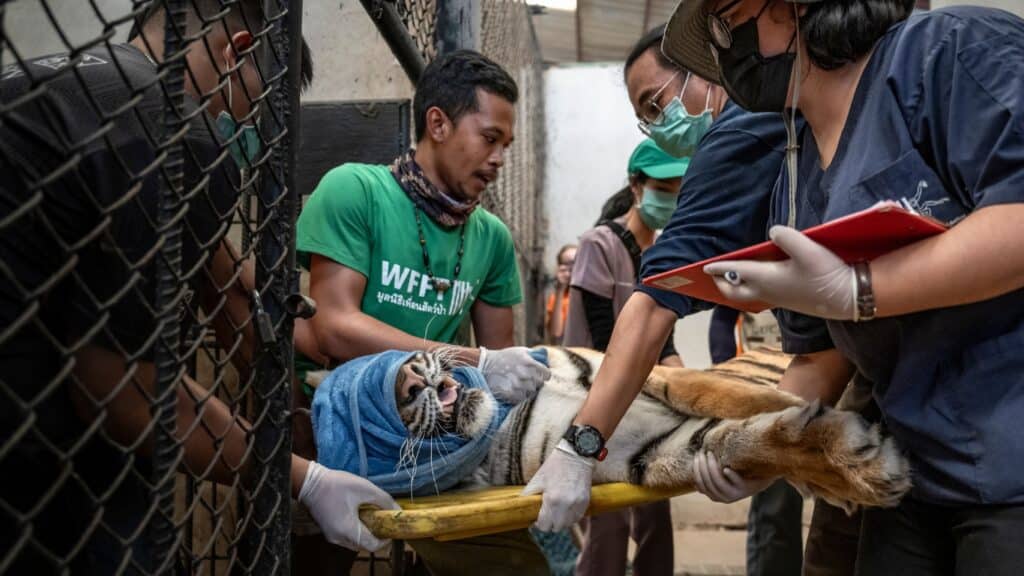
Laos – Lao Conservation Trust for Wildlife, Asia
In Laos, Asia, endangered and critically endangered species are hunted, poached and trafficked for their meat, skin and scales, often used in traditional ‘medicines.’ We work with the Lao Conservation Trust for Wildlife (LCTW), supporting their efforts to rescue, rehabilitate and release abused animals.
We donated funds towards its sanctuary relocation, which took place in 2024, and for the care and rehabilitation of pangolins, primates and other rescued animals saved from criminals. Laos is a key corridor for the illegal wildlife trade in Asia, and LCTW has its hands full caring for the victims of this abominable industry.
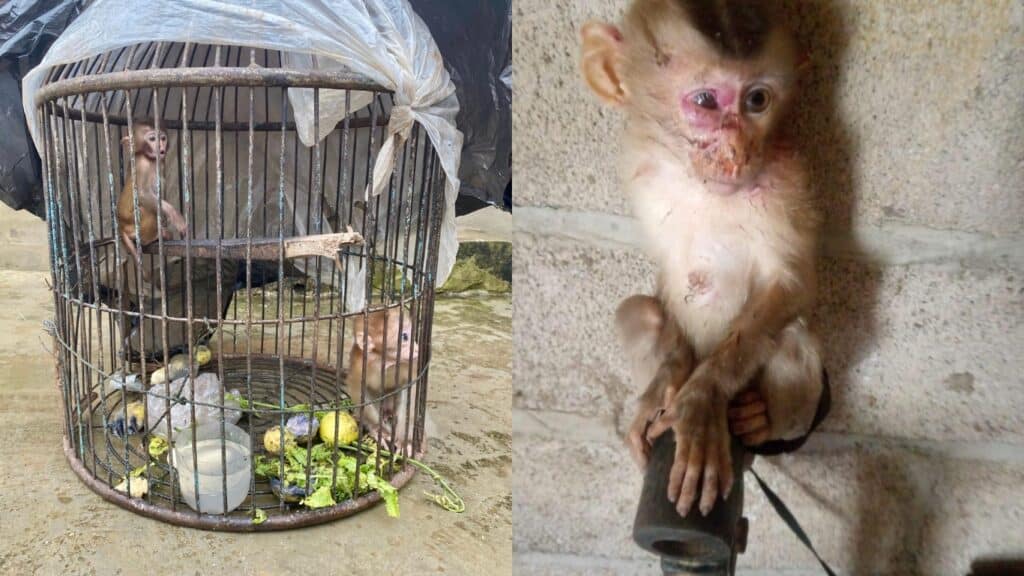
Wild Felid Advocacy Center of Washington, Washington
Our partner sanctuary in the United States, Wild Felid Advocacy Center of Washington (WFACW), was dealt a devastating blow when a freak avian flu outbreak claimed the lives of 21 of their big cats. Six more were left in need of critical support.
With the source of the outbreak believed to be contaminated food, the team was forced to destroy three tons of food for the animals to prevent possible further infections. This caused a massive financial crisis for the sanctuary, ASI ensured that the surviving cats got the nutrition they needed by donating funds to replace crucial food supplies.
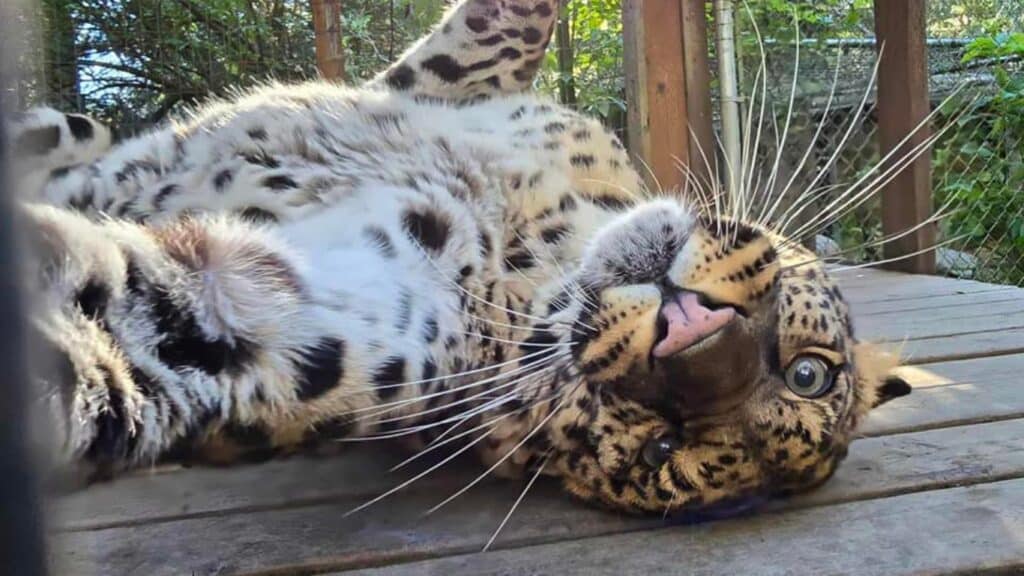
ONCA Wildlife Sanctuary, Bolivia
In Bolivia, jaguars are killed for their body parts, which are in high demand in Asia for use in unproven traditional ‘medicine.’ Their teeth are particularly sought-after, while their bodies are either left to rot or boiled down into a treacle-like ‘paste’ and sold. Body parts are even smuggled into prisons, where they are fashioned into goods for resale.
Jaguar cub Khali was just an infant when she was rescued by our partner, ONCA Wildlife Sanctuary. Her mother was likely killed by poachers; we suspect Khali was kept as a ‘pet’ until she became too wild, and was discarded in a dumpster in Santa Rosa del Tacuma.
The ONCA team has placed her in a rehabilitation program designed to prepare her for release into a protected wild area, where she can live the natural life she deserves. But to ensure she retains her natural instincts – crucial to her survival in the wild – Khali needed a large space to roam while the team looked for her new home. ASI contributed towards the construction of a spacious enclosure, helping Khali prepare for her life in the wild.
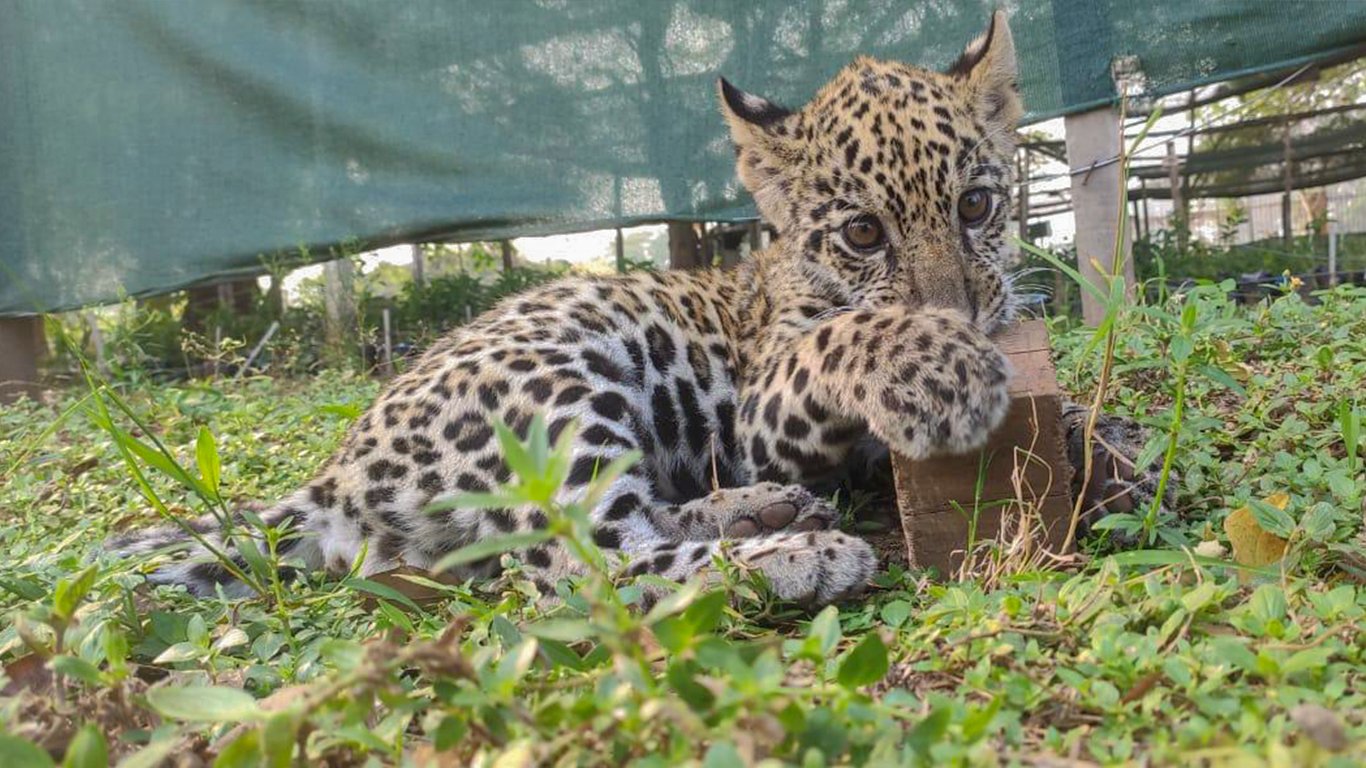
Globally
We work around the world to persuade governments to tighten and enforce legislation that stops poaching and prevents illegal wildlife trafficking. Through raising awareness and supporting projects on the ground, we hope to encourage understanding of the issues at stake, so solutions can be found, and wild animal populations can be restored.
